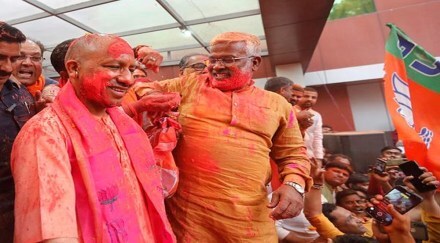Conventional wisdom was that if Yogi Adityanath won Uttar Pradesh narrowly, he might be eased out in six months; if it was a grand victory, he was here to stay and emerge as eventual successor to Prime Minister Narendra Modi. But nothing is ever certain in politics. The UP victory was as much Amit Shah’s as Adityanath’s. If there were any doubts as to who called the shots in the campaign, one had merely to visit the respective headquarters of Adityanath and Shah in Varanasi in the last days of the campaign. The CM stayed at the circuit house and only a few government cars were parked in the vicinity. But a stream of VIP visitors descended at the Taj Hotel, where Shah was staying. The callers included BJP president J P Nadda, Union minister Giriraj Singh, state minister Shrikant Sharma, state organisational chief Sunil Bansal, and Navneet Sehgal, the man considered the go-to man in UP’s officialdom, besides half-a-dozen Lok Sabha MPs from the state. Even Manoj Sinha took time off from his gubernatorial duties in J&K to confer with Shah. Significantly, Modi did not specifically mention Adityanath’s name while referring to the UP victory on Friday.
Full-timer needed
The disenchantment with Rahul Gandhi has grown exponentially after the Assembly results. The Congress succeeded in snatching defeat from the jaws of victory in states like Punjab and Uttarakhand. Many Congresspersons grumble privately that while the BJP is led by a man who is on the job 24 x7, Rahul is periodically missing. For instance, Rahul contracted Covid in April 2021 and was out of action for over a month. This was the crucial period when Gandhi should have been chalking out strategy for potentially winnable states like Punjab, Uttarakhand and Goa. The problem is that no one in his party is willing to take decisions without the de facto president’s approval. Many of Rahul’s appointees are inexperienced and lack clout or standing. His main aides K C Venugopal and Randeep Surjewala are fairly anonymous. And some of those in charge in the states are complete unknowns such as Devendra Yadav for Uttarakhand, and Harish Chaudhary for Punjab. To put Harish Rawat in charge of Punjab ahead of the Uttarakhand polls was suicidal.
Missing the mood
Some in the media were misled in the last lap of the UP campaign by the intensity of the feelings voiced by Akhilesh Yadav’s supporters. A senior columnist was swayed by the fact that he was almost trampled in a stampede of overenthusiastic participants at an SP rally. In western UP, a few journalists focused largely on interviewing those who had participated in farmer rallies to sense the electoral wind, ignoring a sizable silent chunk from the BPL (Below Poverty Line) who were more concerned about the free ration allowances distributed by Yogi Adityanath’s government post Covid.
Taken for a ride
Prashant Kishor’s Goa gamble proved a costly adventure for the Trinamool Congress, which drew a blank in the polls. For former CM Churchill Alemao, who considered Benaulim his family’s fiefdom, aligning with the TMC proved a liability as the five-time MLA lost to AAP. Another political heavyweight, Luizinho Faleiro, was rewarded with a Rajya Sabha seat last year for joining the TMC, but the TMC failed to win from his former constituency of Navelim. The TMC funded the campaign of its ally, the Maharashtrawadi Gomantak Party, which pledged the support of its two MLAs to the BJP government on counting day.
PM’s snub
PM Narendra Modi was upset with the Ministry of External Affairs after the Russian offensive on February 24. He felt the ministry did not brief the government adequately and its advisories to Indians living in Ukraine were vague. At the Cabinet Committee on Security that day, it was noteworthy that Minister for Petroleum Hardeep Puri and Minister for Commerce Piyush Goyal were invited to attend, though both are not members of the CCS. A further snub to the MEA was that the Prime Minister dispatched four senior ministers unconnected with foreign affairs, Hardeep Singh Puri, Jyotiraditya Scindia, V K Singh and Kiren Rijiju, to get Indian students out of Ukraine. The three Ministers of State in the MEA stayed back in India. (During Modi’s first term, then MEA MoS V K Singh was in charge of evacuations of Indian nationals in Yemen and South Sudan.) Puri, who is from the IFS cadre, was proactive in providing inputs during the evacuation exercise. The decision to dispatch senior ministers to oversee the programme to get Indians back from Ukraine may have kept MEA officials on their toes and may have been good for optics and media coverage. It also meant that the MEA staff was sometimes diverted from its main purpose while making arrangements for VIPs.
